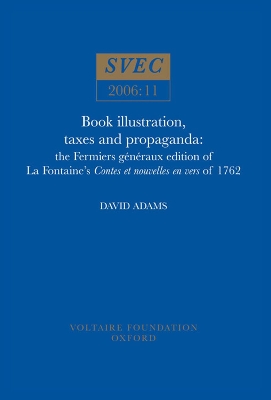Oxford University Studies in the Enlightenment
1 total work
2006:11
La Fontaine's Contes et nouvelles en vers was probably the most famous illustrated book to have appeared in France during the eighteenth century. The celebrated 1762 edition, published by Louis XV's detested tax-gatherers, the Compagnie des Fermiers généraux, held among its claims to supremacy its magnificent copperplate illustrations, designed by Charles Eisen.
In this highly illustrated book, David Adams first sets out a publishing history of the edition, using historical, bibliographical and cultural evidence, and next provides a detailed study of the plates as a whole. In so doing, he gives his interpretation of the values and attitudes of the Compagnie, the members of which took great care to ensure that the plates reflected their view of contemporary society. Finally, he gives a synoptic view of the illustrations, and situates the work in the wider context of contemporary French illustrated books.
This pioneering study of the relationship between text and image in eighteenth-century France shows that the illustrations the Fermiers généraux commissioned for this literary classic were intended to promote their own patrician values, and to assert their freedom of action, turning literature into propaganda with consequences they did not foresee.
In this highly illustrated book, David Adams first sets out a publishing history of the edition, using historical, bibliographical and cultural evidence, and next provides a detailed study of the plates as a whole. In so doing, he gives his interpretation of the values and attitudes of the Compagnie, the members of which took great care to ensure that the plates reflected their view of contemporary society. Finally, he gives a synoptic view of the illustrations, and situates the work in the wider context of contemporary French illustrated books.
This pioneering study of the relationship between text and image in eighteenth-century France shows that the illustrations the Fermiers généraux commissioned for this literary classic were intended to promote their own patrician values, and to assert their freedom of action, turning literature into propaganda with consequences they did not foresee.
